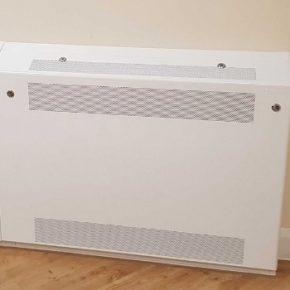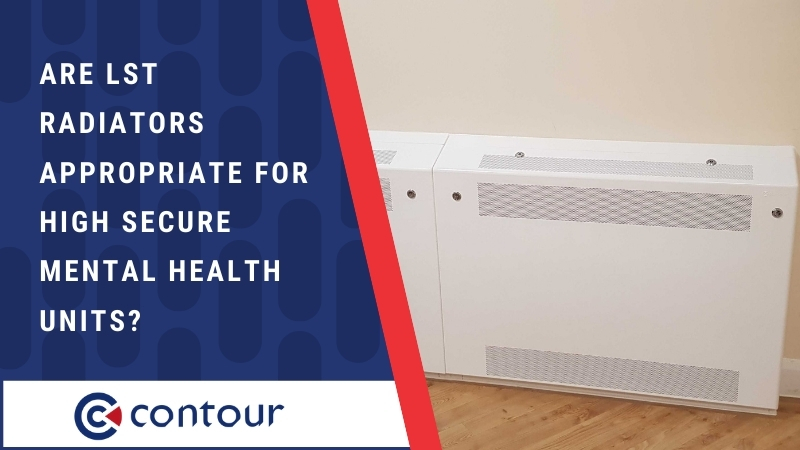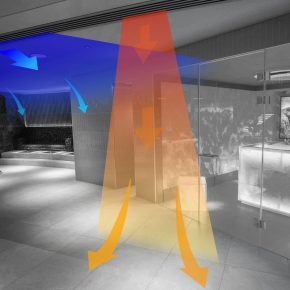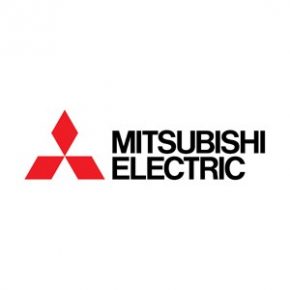
Contour: Are LST Radiators Appropriate For High Secure Mental Health Units?
Psychiatric intensive care units (PICUs) are intended to look after patients who cannot be managed on open psychiatric wards due to the level of risk the Service User poses to themselves or others. If you’re an architect or a specifier, you must keep PICUs as safe and secure as possible. For heating solutions, you may be thinking about an LST radiator, but is it the best solution? Contour discusses…
There are levels of risks because PICUs are wards for adult inmates to deliver inpatient mental health care assessment and full treatment to individuals who are experiencing severe mental disorders.

Are LST Radiators The Best Solution For PICUs? Contour answers the question.
The simple answer is no. The belief can be because LST radiators are low-surface radiators that they’re safe which, in many cases, is true.
However, when working in high-security mental health settings, consider a radiator that has anti-ligature features to mitigate any acts of vandalism and self-harm, which could lead to serious injury to Service Users and staff alike.
Anti-Ligature Radiators For High-Secure Mental Health Hospitals
It’s commonly thought that suicide risk comes from ligature points above head-height. However, studies show suicides can, unfortunately, occur where ligature points have been below the head or even at waist height.
For this reason, it’s necessary to select a radiator that is anti-ligature to keep all individuals safe and secure.
To ensure lower ligature risks, search for an anti-ligature radiator that follows these certain characteristics:
– Small grilles (recommendation is for IP3X rated grilles)
– (If wall secured) No large gaps between product and wall
– Minimal gaps or joints
– No sharp edges
– Bullnose, rounded corners
– Security locks and fixings
The Durable Heating Solution For High-Secure Mental Health Environments
What was once a suitable radiator/guard may need to undergo evaluation to ensure they meet challenges PICUs face today.
To understand these challenges, consider the changes PICUs have undergone over the past few years. PICUs now offer more freedom to service users – with access to personal belongings and control over their comfort.
Whilst this extra independence may advance morale in a high-secure mental health facility, it does create more opportunities for users to carry out acts of vandalism and self-harm.
To protect all service users at PICUs, search for an anti-ligature radiator made from 1.5-2mm Zintec steel. For maximum protection, search for a 3mm Zintec steel solution.
Also note the addition of strengthening struts increases durability too.
Contour Conclusion
To ensure maximum security and safety, search for a heating solution that fits in well with today’s modern-day PICU.
An anti-ligature heating solution built to withstand vandalism, with minimised ligature risks, may be the solution.
For protection, Contour anti-ligature radiators are made in Zintec protected steel in various gauges from 1.5mm-3mm. This offers a strong, durable heating solution.
If your environment is a PICU that requires extra strength, Contour can provide a strengthening strut for additional depth and protection.
Complete with safe edges and IP3x grilles, Contour’s anti-ligature radiators help reduce the opportunities for service users to tie rope or cord around – or through – an exposed ligature.
For peace of mind, all radiators come with a five-year warranty against defects in workmanship and materials for five years from the purchase date.
Contour can be contacted at;
The Mansions
43 Broadway
Shifnal
TF11 8BB
Tel: 01952 290 498
Email: sales@contourheating.co.uk
Visit Supplier's page
Latest news

1st April 2025
Gilberts Takes Thermal Comfort to New Heights
Gilberts Blackpool is continuing to build on its reputation as a pioneer with the unveiling of ThermaAstute™ – the most extensive range of thermally sensitive diffusers in the market.
Posted in Air Conditioning, Articles, Building Industry News, Building Products & Structures, Building Services, Facility Management & Building Services, Heating, Ventilation and Air Conditioning - HVAC, Innovations & New Products, Restoration & Refurbishment, Retrofit & Renovation, Sustainability & Energy Efficiency
1st April 2025
University of Bath Student Helps Vent-Axia Win Two Environmental Industry Awards
Leading ventilation manufacturer, Vent-Axia, is delighted that the valuable work University of Bath student Roben Els undertook during an industry placement at the company contributed to it winning two environmental industry awards.
Posted in Air Conditioning, Articles, Awards, Building Industry Events, Building Industry News, Building Products & Structures, Building Services, Heating, Ventilation and Air Conditioning - HVAC, Recruitment, Retrofit & Renovation, Sustainability & Energy Efficiency, Training
1st April 2025
Ahmarra: Fire Doors Designed for Hospitals & Healthcare Environments
Ahmarra is a leading UK specialist in fire doors for healthcare environments, having manufactured and installed thousands of bespoke doorsets for NHS hospitals across London and the South East.
Posted in Access Control & Door Entry Systems, Accessibility, Acoustics, Noise & Vibration Control, Architectural Ironmongery, Articles, Building Industry News, Building Products & Structures, Building Services, Building Systems, Doors, Facility Management & Building Services, Health & Safety, Interior Design & Construction, Interiors, Restoration & Refurbishment, Retrofit & Renovation, Security and Fire Protection, Timber Buildings and Timber Products, Wooden products
1st April 2025
Mitsubishi Electric: New intuitive, IoT-ready centralised controller offers instant access to 400 units
Mitsubishi Electric has launched a new user-friendly, touchscreen controller to offer full remote controllability, monitoring and reporting for up to 400 air conditioning units.
Posted in Air Conditioning, Articles, Building Industry News, Building Products & Structures, Building Services, Facility Management & Building Services, Heating Systems, Controls and Management, Heating, Ventilation and Air Conditioning - HVAC, Information Technology, Innovations & New Products, Pipes & Fittings, Plumbing, Posts, Research & Materials Testing, Retrofit & Renovation, Sustainability & Energy Efficiency
 Sign up:
Sign up: